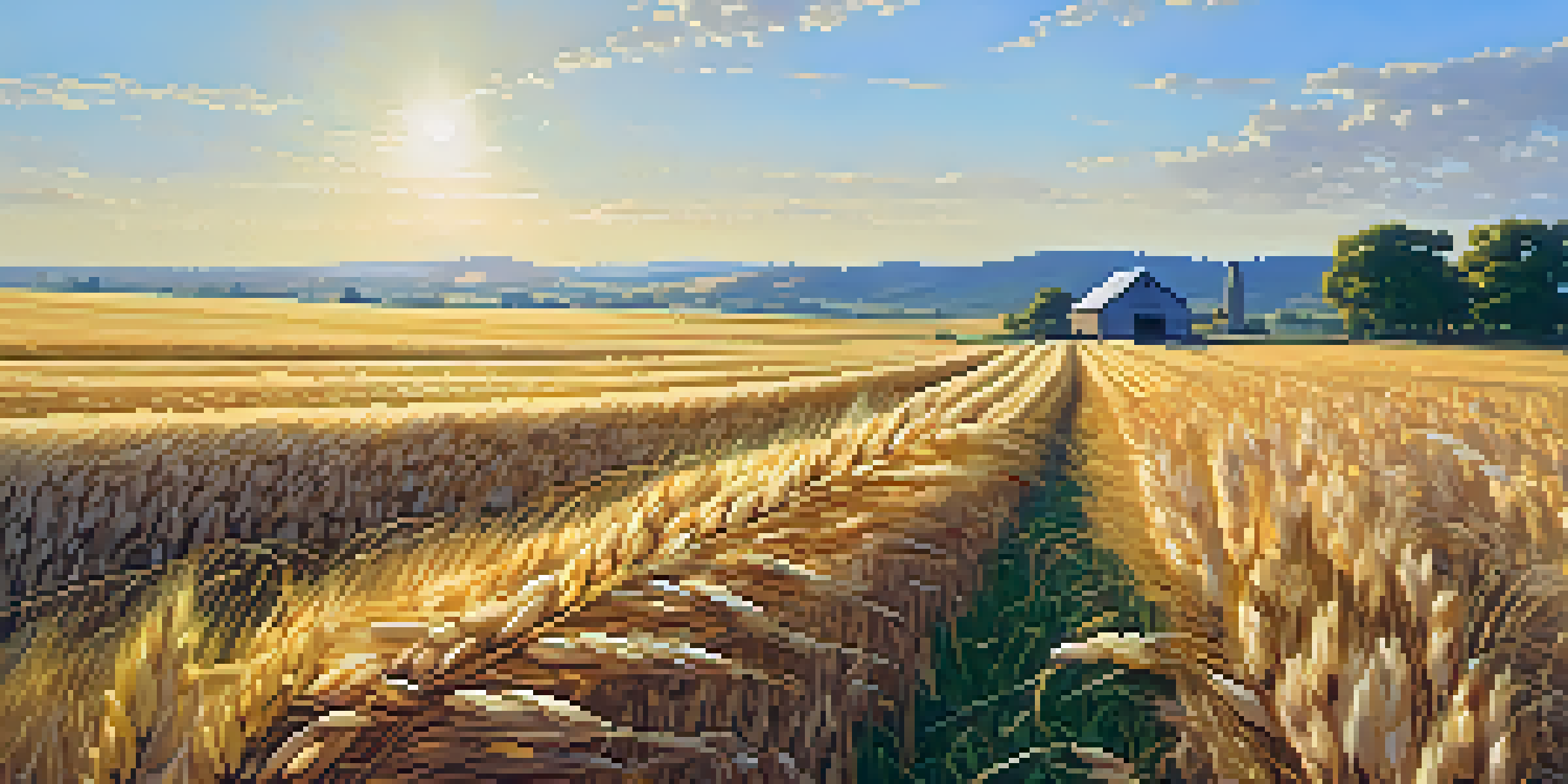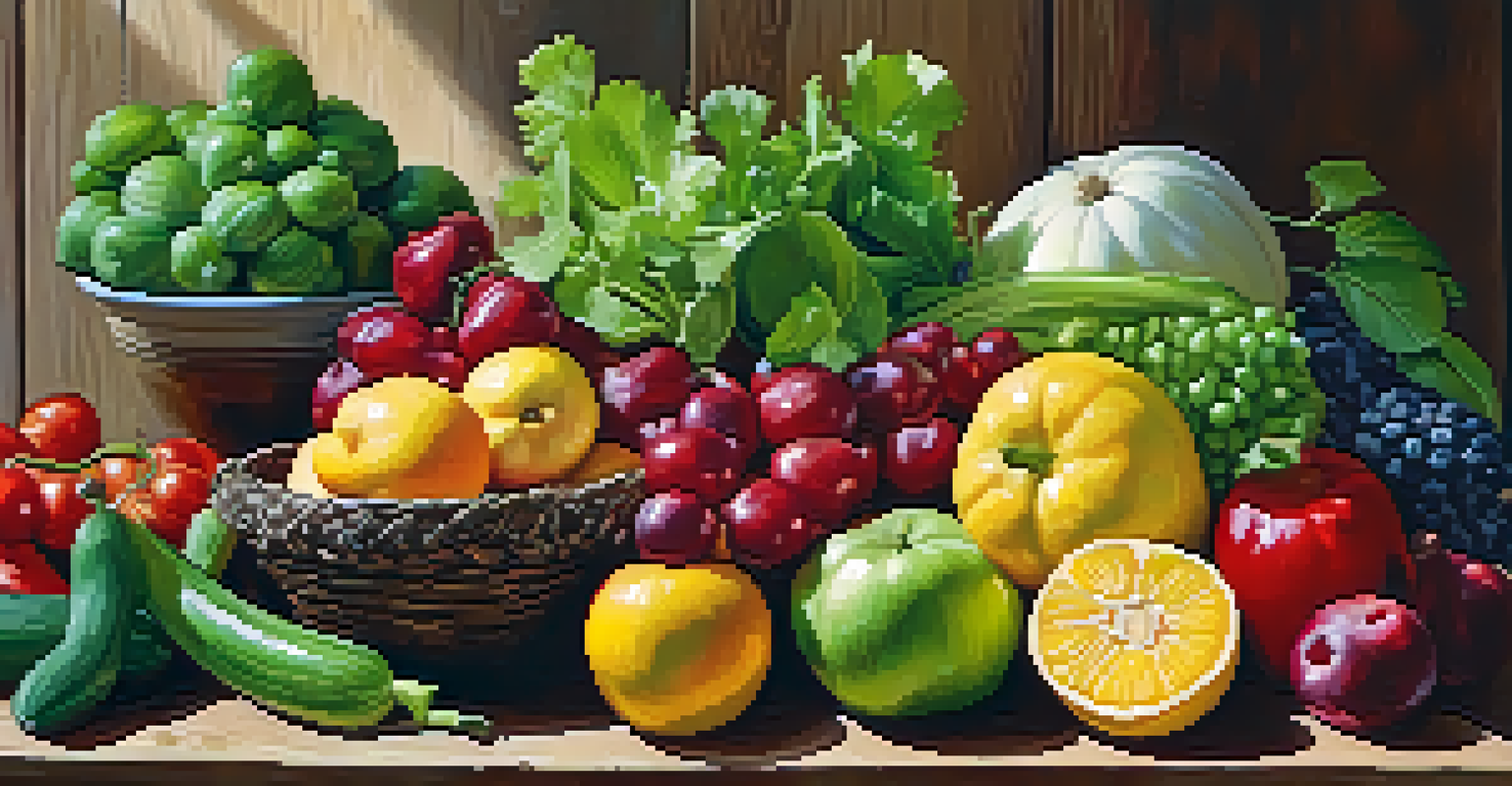Agricultural Commodities: Investing in Food Products

Understanding Agricultural Commodities and Their Importance
Agricultural commodities are raw products derived from farming, such as grains, fruits, and livestock. They play a vital role in the global economy, affecting everything from food prices to job markets. Understanding these commodities is essential, especially for investors looking to diversify their portfolios.
Agriculture is our wisest pursuit, because it will in the end contribute most to real wealth, good morals, and happiness.
The demand for food products is ever-increasing, driven by population growth and changing dietary preferences. This creates opportunities for investors who wish to capitalize on the agricultural market. By recognizing the various types of commodities, you can make informed decisions about where to invest your money.
Investing in agricultural commodities can also serve as a hedge against inflation. As food prices rise, commodities often increase in value, making them an attractive option for those concerned about the purchasing power of their money over time.
Types of Agricultural Commodities to Consider
When it comes to agricultural commodities, they generally fall into two categories: soft and hard commodities. Soft commodities include products like coffee, cocoa, and cotton, whereas hard commodities are often energy-related, like corn and wheat. Understanding these categories can help you decide which commodities align with your investment strategy.

Additionally, seasonal cycles can greatly impact the availability and pricing of these commodities. For example, weather conditions can affect crop yields, leading to fluctuations in market prices. Investors should monitor these factors closely to anticipate market movements and make strategic decisions.
Importance of Agricultural Commodities
Agricultural commodities are essential to the global economy, influencing food prices and investment opportunities.
Some investors may find it beneficial to focus on specific sectors such as grains, livestock, or even tropical products. Each sector has its unique characteristics and potential for growth, so identifying your interests and risk tolerance will enhance your investment experience.
How to Invest in Agricultural Commodities
Investing in agricultural commodities can be done through various means, including futures contracts, ETFs, and mutual funds. Futures contracts allow investors to lock in prices for commodities to be delivered in the future, offering the potential for profit but also introducing risk. It's essential to understand the mechanics of these contracts before diving in.
The future of agriculture is not about just producing more food. It’s about producing food sustainably and responsibly.
Exchange-Traded Funds (ETFs) provide a more straightforward way to invest in a basket of agricultural commodities without dealing with the complexities of futures. They can be an excellent option for beginners or those looking to diversify their portfolios without significant exposure to individual commodity risks.
Another option is mutual funds that specialize in agricultural investments. These funds are managed by professionals who have the expertise to navigate the market, making them suitable for those who prefer a hands-off approach to investing.
Risks Associated with Agricultural Commodities Investing
Like any investment, agricultural commodities come with risks. Price volatility is a significant concern, as commodity prices can fluctuate dramatically due to weather events, geopolitical tensions, or changes in consumer preferences. Being aware of these factors will help you manage your investment effectively.
Additionally, the agricultural sector can be affected by regulatory changes and trade policies. For instance, tariffs on imported goods can impact prices and availability, creating uncertainty in the market. Keeping an eye on policy changes will be crucial for any investor in this field.
Investment Strategies in Commodities
Investors can explore various avenues like futures contracts, ETFs, and mutual funds to engage in agricultural commodities.
Investors should also consider the impact of currency fluctuations, especially if investing in international markets. A strong currency can negatively affect the price competitiveness of exports, while a weak currency might boost it. Understanding these dynamics will enable you to make more informed investment choices.
The Role of Technology in Agriculture Investments
Technological advancements are transforming the agricultural sector, leading to increased efficiency and productivity. Innovations like precision farming and biotechnology are making it possible to produce more with fewer resources, which can positively impact commodity supply and pricing. As an investor, keeping an eye on these trends can provide valuable insights.
Moreover, data analytics plays a significant role in understanding market trends and consumer behavior. By leveraging technology, investors can make more informed decisions based on real-time data and predictive analytics. This knowledge can give you a competitive edge in the commodities market.
Investing in companies that are at the forefront of agricultural technology can also be a strategic move. These companies are likely to benefit from the growing demand for efficient food production methods, making them attractive options for investors looking to capitalize on this trend.
Sustainable Practices in Agricultural Commodities
Sustainability is becoming increasingly important in the agricultural sector, as consumers are more aware of the environmental impact of food production. Investors who prioritize sustainable practices can contribute to a more eco-friendly industry while also meeting the demand for responsibly sourced products. This approach can enhance brand loyalty and, in turn, profitability.
Many companies are adopting sustainable farming practices, such as organic farming and regenerative agriculture, which can lead to healthier soil and improved biodiversity. By investing in these companies, you’re not just making a financial commitment but also supporting a more sustainable future for agriculture.
Future Trends in Agriculture Investing
The future of agricultural commodities investment is promising, driven by technology, sustainability, and emerging markets.
Furthermore, certifications like Fair Trade and Rainforest Alliance can signify a commitment to sustainable practices. Investors should look for these certifications when choosing companies to invest in, as they often correlate with consumer preference and loyalty.
Future Trends in Agricultural Commodities Investment
The future of agricultural commodities investing looks promising, especially with the growing global population and increasing food demand. As more people require food, the need for efficient production methods and innovative solutions will only intensify. Investors who recognize this trend can position themselves advantageously.
Emerging markets are also becoming significant players in agricultural commodities. Countries with developing economies are experiencing shifts in food consumption patterns, leading to new opportunities for investors. Keeping an eye on these markets can uncover unique investment prospects.

Lastly, the integration of technology and sustainability will shape the future landscape of agricultural investments. As more companies embrace these trends, investors who align their strategies with these changes will likely see favorable returns in the evolving market.